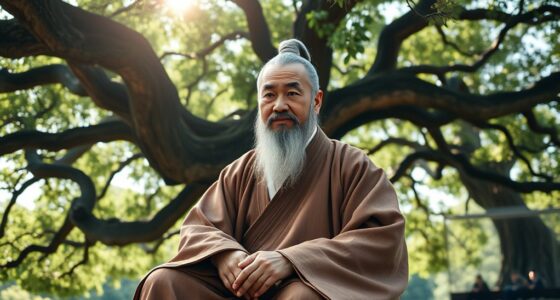Socrates believed education is about igniting your curiosity and encouraging critical thinking, much like stirring a flame, not just filling your mind with facts. Instead of passive learning, you’re encouraged to engage actively through questions, dialogue, and reflection. This approach helps you develop understanding and independent thought. If you want to discover how to turn education into a lifelong journey of exploration and insight, keep exploring these ideas further.
Key Takeaways
- Socrates believed education should ignite curiosity and critical thinking, rather than simply transferring facts.
- His method involves active dialogue and questioning, akin to kindling a flame, not pouring water into a vessel.
- The approach fosters independent thought, self-discovery, and lifelong learning instead of passive memorization.
- Engaging students through thoughtful questions creates ownership of learning and deeper understanding.
- Incorporating interactive techniques enhances mental engagement, turning education into a transformative, inspiring journey.

Many people see education as simply filling a student’s mind with facts, but Socrates believed it’s much more than that. To him, teaching methods should do more than transmit information; they should spark curiosity and foster critical thinking. Instead of delivering lectures filled with rote memorization, Socrates emphasized engaging students in dialogue. He believed that through questioning and discussion, students actively participate in their learning, making it meaningful and lasting. This approach transforms learning from passive reception into an interactive process that ignites a desire to understand.
Education sparks curiosity and critical thinking through dialogue, transforming passive learning into an engaging quest for understanding.
You can think of Socrates’ method as a way to kindle a flame rather than pour water into a vessel. When students are merely passive recipients of knowledge, their minds stay cold and unresponsive. But when they are involved—asking questions, debating ideas, examining assumptions—they begin to develop their own insights. This active engagement creates a sense of ownership over their learning, making it more likely they’ll remember and apply what they’ve learned. Socrates saw student engagement as the key to education that truly enlightens.
His teaching methods involved posing challenging questions rather than providing direct answers. By doing so, he encouraged you to think deeply about your assumptions and beliefs. This method requires patience and trust, as it may seem less efficient than simply delivering facts, but it builds your capacity for independent thought. As you participate in Socratic dialogues, you learn to analyze issues from multiple perspectives, sharpening your reasoning skills. This process helps you discover knowledge for yourself, rather than passively accepting someone else’s.
Socrates believed that effective education awakens your innate curiosity and drives you to seek understanding on your own. When teachers adopt his approach—using thoughtful questions and promoting active dialogue—they create an environment where student engagement flourishes. In this setting, learning becomes an exciting journey rather than a chore. Your role isn’t just to memorize information but to explore ideas, challenge assumptions, and develop your critical faculties. This kind of education not only imparts knowledge but also cultivates wisdom, which remains with you long after the facts fade.
In essence, Socrates’ view of education emphasizes the importance of engaging your mind actively. His teaching methods aim to light a fire within you, inspiring lifelong learning and intellectual independence. When you participate fully in this process, education becomes a transformative experience—more about kindling a flame than simply filling a vessel. Additionally, incorporating interactive learning techniques can further enhance student engagement and comprehension.
Frequently Asked Questions
How Does Socrates’ Educational Philosophy Influence Modern Teaching Methods?
Your teaching style is influenced by Socrates’ educational philosophy, emphasizing philosophical inquiry and active dialogue. You encourage students to question, explore ideas, and discover answers themselves, much like in ancient dialogues. This approach fosters critical thinking and deep understanding rather than rote memorization. By applying Socrates’ methods, you create an engaging learning environment where students become active participants, cultivating curiosity and independent thought.
What Are Practical Ways to Implement Socratic Questioning Today?
You can implement Socratic questioning through effective dialogue techniques in your classroom by asking open-ended questions that encourage critical thinking. Don’t shy away from challenging students’ assumptions; instead, guide them to explore deeper answers. Use classroom implementation strategies like small group discussions and reflective journaling. This approach fosters active engagement, helping students develop reasoning skills and a love for learning, just as Socrates envisioned.
How Does Socrates Define True Knowledge Versus Opinion?
You see, Socrates distinguishes true knowledge from opinion through epistemological distinctions. He argues that true knowledge is justified, stable, and aligns with reality, while opinion is merely a personal belief lacking solid evidence. When you seek understanding, focus on uncovering reasons and evidence, recognizing that opinions can be mistaken. This approach helps you differentiate between what you truly know and what you just believe.
What Criticisms Exist Against Socrates’ Educational Approach?
You might criticize Socrates’ educational approach for its pedagogical limitations, as it relies heavily on questioning rather than direct teaching, which can be inefficient for some learners. Additionally, his method has elitist implications, since only those willing to engage deeply and think critically can truly benefit. This approach may overlook the diverse needs of learners, making education seem exclusive rather than accessible to everyone.
How Can Educators Foster a Flame of Curiosity in Students?
Did you know that students with high curiosity levels are 25% more likely to retain information? To foster a flame of curiosity, you should encourage mindful engagement by asking open-ended questions and exploring students’ interests. Nurture their curiosity through hands-on activities and real-world connections, creating a safe space for exploration. This approach ignites passion for learning, making education an ongoing discovery rather than mere memorization.
Conclusion
Remember, true education sparks your inner flame, inspiring curiosity and critical thinking. It’s not about simply filling your mind with facts but about igniting a passion for learning that lasts a lifetime. When you embrace this approach, you’ll find yourself continually growing, questioning, and discovering. So, don’t just gather knowledge—kindle that fire within, and let it guide you toward wisdom and understanding that transcend mere information.









